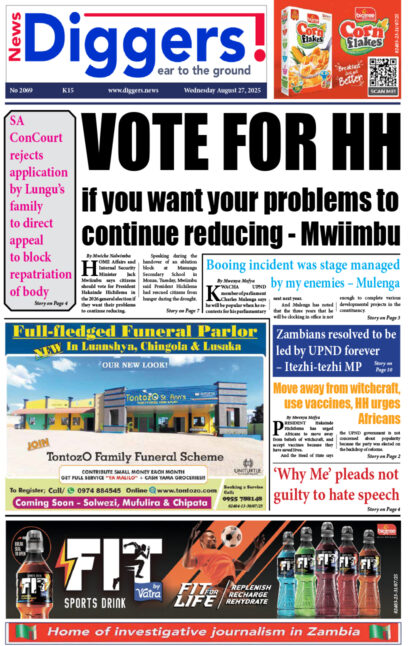ACTIONAID Zambia executive director Nalucha Ziba says Speaker of the National Assembly Patrick Matibini was given preferential treatment in the acquisition of land at the Lusaka South Multi Facility Economic Zone and has called for a reversal of the transaction.
And Ziba says the transaction brings to question the calibre of leaders that have been entrusted to run the affairs of the nation.
In response to a press query, Ziba questioned the transparency of the process and subsequent transaction.
“The land transaction between Lusaka South Multi Facility Economic Zone (MFEZ) and Mashikili Property Development Limited which is chaired by Speaker of National Assembly Dr. Patrick Matibini indicates some elements of undue influence in the manner the transaction was done. ActionAid observes that the land was bought way before it was surveyed and valued leading to the underpricing of the land. Even if the earlier quotation given to Mashikili Property Development Limited was for industrial land, the subsequent reduction to reflect the price of residential prices, was not only unreasonable but also questionable. Furthermore, we question the transparency of the process and the subsequent transaction as it is clear that, Dr. Matibini was given preferential treatment in a manner that is likely to lead to greater benefits, access, rights, opportunities or status than those of ordinary citizens. With this background, ActionAid, is calling for Lusaka South Multi Facility Economic Zone (MFEZ) to further revisit the transaction and if possible reverse it,” Ziba stated.
She added that it has become common practice for leaders to access favours and benefits that ordinary citizens struggle to acquire.
“ActionAid Zambia believes that people in positions of leadership have to set a high standard in ensuring their undertakings are above board. With reference to Dr. Matibini’s issue, an ethical trade-off between a high moral standard and acquiring the above mentioned property has to be made. It has become common practice for leaders in Zambia, especially those with access to the corridors of power, to access favours and benefits that ordinary citizens struggle to acquire. This brings into question the calibre of leaders we have in Zambia, who we have entrusted with running the affairs of the country in a transparent and accountable manner, but whose conduct is contrary to this ethos,” Ziba stated.
And Ziba stated that the dealings of the current leaders may have set a negative precedence of poor accountability and transparency.
“There may be negative manifestations of the precedence set by poor accountability and transparency in the dealings of our current leaders. Some of these include emboldening others to undertake opaque (land) transactions knowing they will not be held accountable, flouting of laws with the mindset that they are not enforced when one is in a position of power and perpetuation of corruption which is a by-product of unaccountability. AAZ is of the considered view that there is need to strengthen implementation of the declaration of assets by public officials. In addition, AAZ urges government to consider undertaking life style audit as a measure of curbing illicit transactions in the economy considering the declining corruption ratings signifying rampant corruption,” stated Ziba.
“In a bid to promote transparency and accountability government is obliged to share information with citizens that is needed to make informed decisions and hold officials accountable for their conduct and land management is not exempt from public scrutiny.”
























